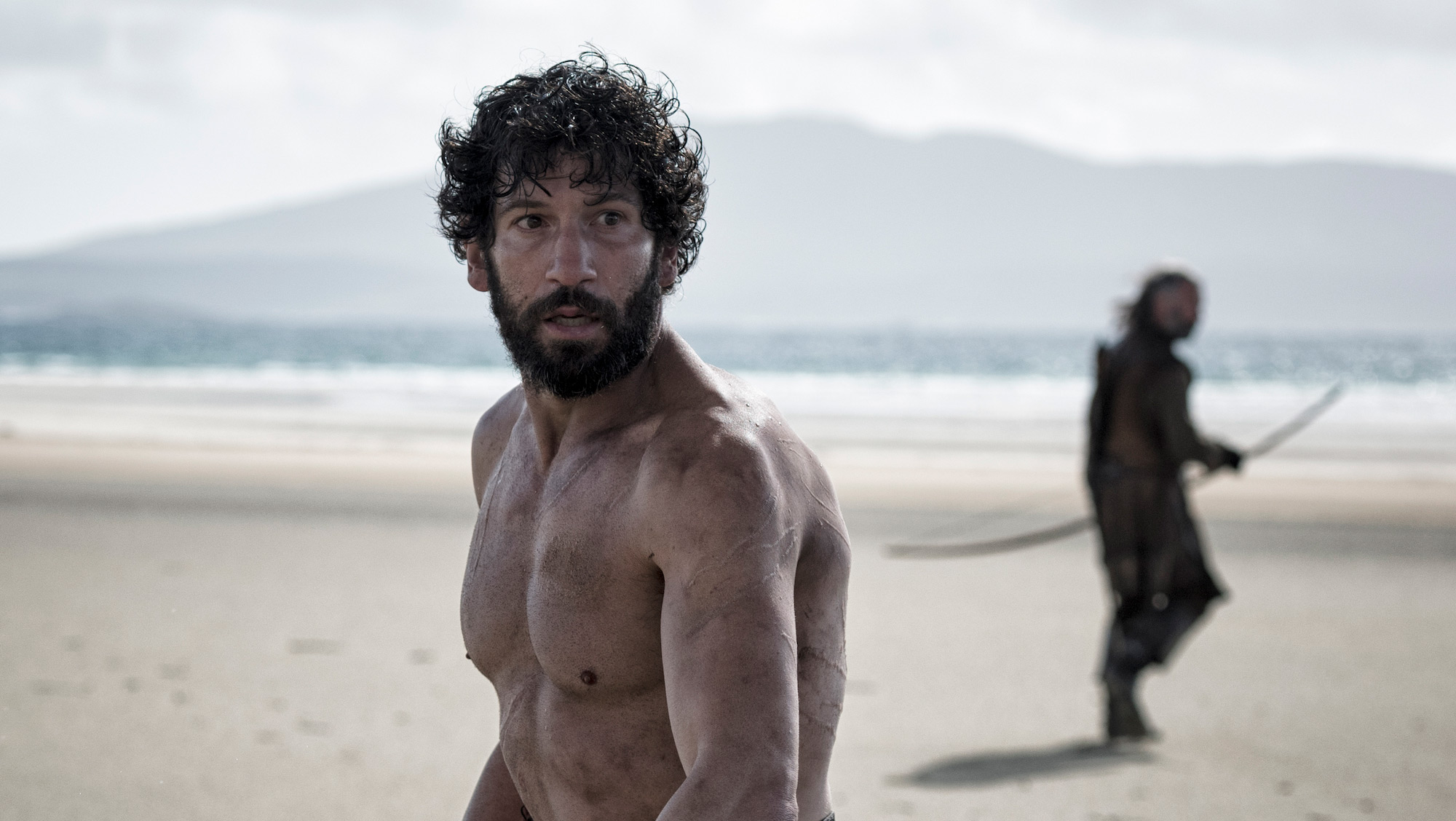Movies that tackle religion tend to fall on one of two camps. We either are graced with films such as Martin Scorsese‘s under-seen (and undervalued) “Silence” or forced to slog through more politicized fare such as “The Shack.” Not only a tricky subject to navigate (and better to avoid) at family get together’s, it’s also a topic that unless made by the hands of a fine craftsman, won’t get the delicate film treatment it deserves. Rather, we’ll get something preaching, cloying and perhaps, a touch offensive. All of which makes first time director Brendan Muldowney’s “Pilgrimage” such an oddity. Both a meditation on of the hunt for power and a fear of the unknown, it is also a “John Wick” style, rising death toll action flick, as the film tries to be too many things at once and only succeeds when its focus becomes clear.
Set in 1209 Ireland during the Crusades, a small group of monks are coerced into a reluctant pilgrimage across an island torn apart by centuries old tribal warfare and the growing dominance of the Norman invaders. While escorting their monastery’s holiest relic to Rome to aid in the foreign war, the value of the prized item becomes increasingly well-known, and they face mounting dangers on their trek that increase in brutal tension.
 Muldowney and writer Jamie Hannigan have created a methodically paced, violent picture that hosts a cast of consistent and fresh actors. An immersive story about one group’s religious crusade, cast against a backdrop wrecked and ravaged by their same faith, it’s far from the gripping tale that it could’ve and clearly strived to be. For all of the moments of violence, both in forms of brutish battle sequences and stomach churning torture scenes, the storytelling is at its best in the quieter, more cerebral moments. However, in terms of sheer directive ingenuity, the action sequences are the best examples of quality that the film has to offer and it’s where Muldowney clearly shines. It’s a shame that these moments are so tonally divorced from the rest of the film, where any time Jon Bernthal’s character, a mute seeking some vague sort of atonement, is asked to fight, the pacing receives a shot of adrenaline as the movie energizes and syncs up with the Mute’s more feral instincts, laying wreckage to anyone who stands in their way. The film, ultimately, feels the strains of a director discovering his footing and being critically unclear about just how he wanted to tell this story.
Muldowney and writer Jamie Hannigan have created a methodically paced, violent picture that hosts a cast of consistent and fresh actors. An immersive story about one group’s religious crusade, cast against a backdrop wrecked and ravaged by their same faith, it’s far from the gripping tale that it could’ve and clearly strived to be. For all of the moments of violence, both in forms of brutish battle sequences and stomach churning torture scenes, the storytelling is at its best in the quieter, more cerebral moments. However, in terms of sheer directive ingenuity, the action sequences are the best examples of quality that the film has to offer and it’s where Muldowney clearly shines. It’s a shame that these moments are so tonally divorced from the rest of the film, where any time Jon Bernthal’s character, a mute seeking some vague sort of atonement, is asked to fight, the pacing receives a shot of adrenaline as the movie energizes and syncs up with the Mute’s more feral instincts, laying wreckage to anyone who stands in their way. The film, ultimately, feels the strains of a director discovering his footing and being critically unclear about just how he wanted to tell this story. Bernthal, as always, is wonderful in his wordless role, bringing both a hulking physicality to the his silent monk which implies his dangerous potential long before we ever see him in action, while also allowing vulnerability to shine behind his eyes as he is forced back into violence. Stanley Weber as Frère Geraldus, the priest sent to collect relic is juxtaposed beautifully with Richard Armitage’s Raymond De Merville who’s trying to steal it. Both are narcissists who believe that the powers that be, no matter in what form, are on their side and theirs alone. Tom Holland shows a much different side to his version of Peter Parker this summer, speaking largely in Gaelic as the novice of the group who also acts as our eyes and ears to the world, the one most effected by the evils he sees transpire.
Bernthal, as always, is wonderful in his wordless role, bringing both a hulking physicality to the his silent monk which implies his dangerous potential long before we ever see him in action, while also allowing vulnerability to shine behind his eyes as he is forced back into violence. Stanley Weber as Frère Geraldus, the priest sent to collect relic is juxtaposed beautifully with Richard Armitage’s Raymond De Merville who’s trying to steal it. Both are narcissists who believe that the powers that be, no matter in what form, are on their side and theirs alone. Tom Holland shows a much different side to his version of Peter Parker this summer, speaking largely in Gaelic as the novice of the group who also acts as our eyes and ears to the world, the one most effected by the evils he sees transpire.





Films about religion are tricky to make, sure, but let’s be honest: even when films about religion are, mirabile dictu, well made, most critics don’t actually know how to engage with theology. Silence, which you cite, got more talk from about colonialism (which, admittedly, was an undercurrent in the film), and at best only generic engagement with the theology, and some critics, like at The Playlist, explicitly balked at the religious concerns of the film. So let’s not get too preachy here.